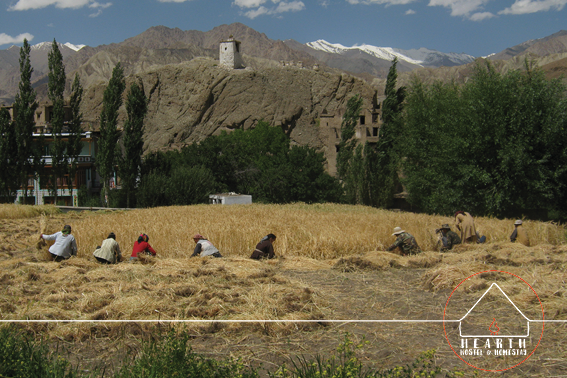BACKPACKING ESCAPADES
At a recent travel show in Mumbai a lot was said about how travelling changes the traveller forever. Moreover the discussions led to a stream of traveling options that brings us closer to not only the landscapes we travel through but also the communities we live with. One of the streams was the different stay options that have outwitted the regular hotel experience of being confined to the comforts of the room with a television and air conditioning. Interestingly the discussion always came back to the comfort zone we all have indulged in and how traveling pushes us beyond our comfort zones.
This led me to think about how traveling the length and breadth of India for the last 15 years has redefined my idea of comfort and the integration of sharing as an integral part of my comfort zone. One of the major shifts in experiential travel came from - like the rest of evolution did - necessity. Traveling can be expensive and to moderate expenses I started staying in community based hostels and family run homestays, as these cut my traveling expense to almost half. A few runs with hostels and homestays brought me to the conclusion that not only my everyday experiences of traveling had improved exponentially, but the geography of my traveling radius increased to a much wider field. I could now visit places where hardly any tourism infrastructure existed and rides in rattling buses sitting next to a goat, a saffron clad ash wearing babaji or a hen perched on the luggage rack were the best stories I had to share share.
This was an amazing discovery as it took me places where I wouldn’t have otherwise gone and brought me the true colours of India. The diversity we hear of in books and songs came alive as women discuss water woes, the neighbours’s newlyweds and god fearing monkeys in small hamlets around the eastern ghats. The love for the guest - atithi deva bhava - is felt sleeping in a row with the host family on the jute sheets (chatai) spread on the earthen floor of a Santhali hut in Jharkhand.

Homestays since then is central to my travel plans and remoter the place the more beautiful its people and better are their stories. I got to see India like the one we read in pre independence poetry of Muhammad Iqbal, Sarojini Naidu and Rabindra Nath Tagore. The poems and songs written in glorification of this land are living in far away homes of these small villages.
The other thing I discovered in homestay travels is that planning becomes homogeneous to the land and its people as you become a part of their plans and rituals. Once these families accept you as one of them, for however short a period, you become an additional member of that family. Don’t mind if you find yourself babysitting a new born or teaching English at the village school without being asked if you like being with children. Or even managing the livestock of the house when your house mama wants some milk for breakfast.
The other expansion of my traveling horizon steered with different cuisines that runs in the bloodline of faraway cultures. In Asansol there is a different sweet for every season and the jaggery they use to make these sweets come from a family living in a village 150kms away. The texture, smell, right amount of sweetening and the wether it is made in, contributes to the exact taste being passed on as a heirloom from generations of sweet loving homemakers in West Bengal.

Such stories and encounters are met on journeys that belong as much to the travelled as it does to the traveler. The recent surge in backpacking youth in India and the ongoing flow of foreign backpackers traveling for their love of mystical India, is helping expand the country’s heritage beyond its palaces and forts and taking it to remote households and farm stays where the colourful diversity India lives. If for the reader traveling is about exploring further landscapes and in doing so enriching the inner soul then staying in homestays working on farms, singing community harvest songs is the way to go about it. To fall in love, smile, laugh and being open every moment on your journey is how traveling can change the traveller forever.
The amount of words I can pour into the idea of experiential travel can fill the literature of a small library in a monastery school library in a remote village of Ladakh but the following words of Marcel Proust sums up the feeling in a sentence I have always loved. “The real voyage of discovery consists not in seeking new landscapes, but in having new eyes.”
Author: Stanzin Namgyal
P.C.: Stanzin Namgyal, Purnima Das, Kristyna Carrot
Tags: Backpacking Communities Family Sustainable Homestay Journeys Stories Landscapes Responsible-Travelling 2018 Leh-Ladakh Blogs




